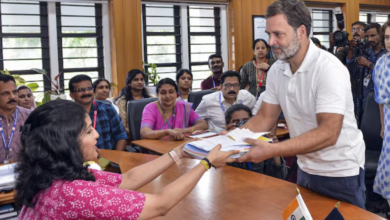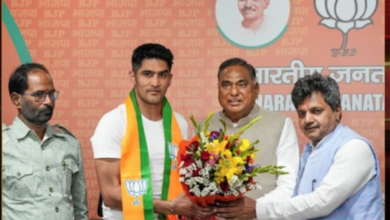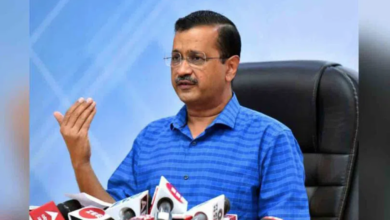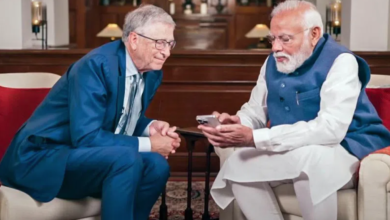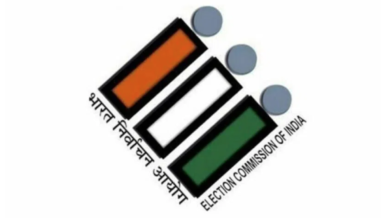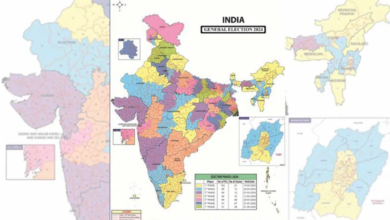Know more about Presidential candidates Draupadi Murmu, Yashwant Sinha
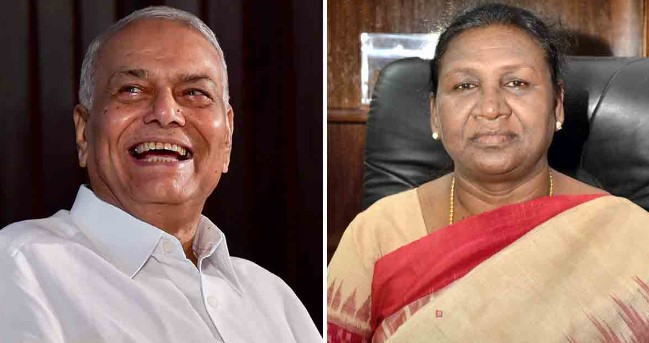
The BJP on Tuesday chose former Jharkhand Governor and tribal leader Draupadi Murmu as its candidate for the post of President, against opposition candidate Yashwant Sinha for the election to be held on July 18.
Draupadi Murmu
Murmu, who hails from Odisha, becomes the first woman tribal leader to contest for the country’s highest constitutional post. Before this, she also holds the record of being the first tribal woman Governor in the country.
Her tenure as the Governor of Jharkhand for more than 6 years was not only been non-controversial, but also memorable. After the completion of her tenure, she left the Jharkhand Raj Bhavan for her village in Odisha’s Rairangpur on July 12, 2021 and is living there since then. Harinarayan Singh, editor-in-chief of a Hindi daily published from Ranchi, said that the name of Murmu for the post of President was also discussed in 2017.
Murmu has a rich experience of more than six years as a Governor. The BJP, with her candidature, is trying to give a symbolic message to the whole of country in many ways.
Her selection for the top post can also be a part of the BJP’s strategy to make inroads into the tribal society, which has been a bastion of the Congress so far. The BJP is eyeing upcoming state Assembly elections, and tribals are its main focus area in Gujarat, Madhya Pradesh, and Chhattisgarh where their votes are crucial for the party’s scheme of things.
Murmu had served twice as an MLA and once as a minister in Odisha, before being sworn in as the Governor of Jharkhand on May 18, 2015. Her five-year term as governor was to end on May 18, 2020, but was automatically extended due to non-appointment of a new Governor due to the ongoing Covid pandemic.
She was always aware of the issues related to tribal affairs, education, law and order, and health of Jharkhand. On several occasions, she questioned decisions of the state governments, but always with constitutional dignity and decency. During her tenure as the ex-officio Chancellor of the Universities, the vacant posts of Vice-Chancellor and Pro-Vice-Chancellor were appointed in many universities of the state.
Senior Professor at Vinoba Bhave University Dr Shailesh Chandra Sharma recalls that she herself organised Lok Adalats on issues related to higher education in the state, in which about 5,000 cases of university teachers and employees were settled. In order to centralise the enrollment process in the universities and colleges of the state, she created the Chancellor’s portal.
Born on June 20, 1958 in Odisha in a simple Santhal tribal family, Murmu started her political career in 1997. She was elected councillor of the district board in Rairangpur in 1997. Prior to joining politics, Murmu worked as an honorary assistant teacher at Sri Aurobindo Integral Education and Research, Rairangpur and as a junior assistant in the Irrigation Department, before joining politics. She has been MLA twice in Odisha and also got a chance to work as a minister in the Naveen Patnaik government, when the BJP was in coalition with the Biju Janata Dal.
Murmu was also awarded the Neelkanth Award for Best Legislator by the Odisha Legislative Assembly.
Yashwant Sinha
Yashwant Sinha’s nearly four-decade-old political life has been marked by bureaucratic efficiency and close association with top leaders, ranging from socialist ideologue Chandra Shekhar to saffron stalwart L K Advani, earning the former IAS officer key party and government positions before his political stars waned in the last decade with the rise of a new BJP leadership.
However, his sharp critique of the Prime Minister Narendra Modi-led government in media over a host of issues running the gamut of policy to politics and tireless efforts to unite anti-BJP forces also ensured the octogenarian leader a space in the opposition camp which has now settled on him as its joint candidate for the presidential election, a high of his public life when it appeared all but over.
Former Union minister Sinha will be the consensus presidential candidate of several opposition parties, including the Congress, the TMC and the Samajwadi Party, the parties said in a joint statement on Tuesday.
Sinha, who served as Finance Minister in the short-lived Chandra Shekhar government and also in the Atal Bihari Vajpayee dispensation, has always carried a rebel streak.
He boycotted the swearing-in ceremony of the V P Singh government in 1989 and then went all out against then BJP president Nitin Gadkari in 2013 over alleged corruption charges when the Maharashtra leader was set to get a second term.
pushed him to the margins of the party whose rank and file always nursed resentment over the rise of a leader not really dyed in the saffron wool.
When the BJP denied him a Lok Sabha ticket in 2014 and instead fielded his son Jayant Sinha, it did little to placate him. He quit the BJP in 2018, alleging that democracy was in danger and joined the Trinamool Congress in 2021.
Born in Bihar and a Bihar-cadre IAS officer, he quit the administrative service after 24 years in 1984 and joined the Janata Party whose leader Chandra Shekhar took a liking to him, considered competent, articulate and clear-headed. He had also served as a principal secretary to the then Bihar chief minister Karpoori Thakur, also a socialist stalwart.
Sinha was soon entrusted with the key position of general secretary and made his debut in Rajya Sabha in 1988.
Various opposition leaders, including Chandra Shekhar, joined hands to form the Janata Dal to take on the Congress in the 1989 poll, and Sinha followed his mentor when he split the party to topple the V P Singh government.
As fortunes of Chandra Shekhar declined and the BJP emerged as the principal challenger to the Congress, Sinha joined the party under the influence of Advani, with whom he shared a good bond.
He was given key responsibilities, including the leader of opposition in Bihar, and later won Lok Sabha poll from Hazaribagh in 1998, the year Vajpayee led his party to form its first regular government after the 13-day stint in 1996 when he resigned after failing to put together a majority in the House.
He remained Finance Minister till 2002 and then made External Affairs Minister.
It was during his term as Finance Minister that the colonial practice to present the Union Budget at 5 pm was junked. He has been credited with ushering in reforms and rationalisation of taxes during the Vajpayee era, though it did not make either him or the government a favourite with the RSS-backed ‘Swadeshi’ school of economic thought, seen to be a reason for his shift from the ministry.
With the BJP-led NDA having a distinct numerical advantage over the opposition, Sinha’s prospects seem bleak in what appear to be largely a symbolic fight. But he can be counted to make the most of it.

